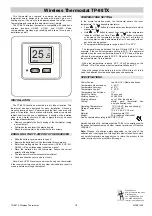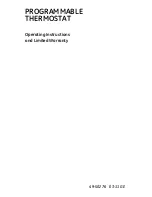
tion coefficients are accepted for calibrated sensors. With thermistors, tempera-
ture can be calculated according to the Steinhart-Hart equation or a polynomial
with user-specified coefficients. With thermocouples, temperature is calculated
according to the standard tables for type B, E, J, K, N, R, S, T, and gold-plati-
num thermocouples as well as a polynomial or user-specified table. Adjust-
ments to the standard curve can be made for improved accuracy.
Thermocouples can be used with internal or external cold-junction compensa-
tion. Characterizations are independently chosen for each sensor channel. Tem-
perature can be displayed in units of degrees Celsius, degrees Fahrenheit, or
Kelvin.
The temperature conversion algorithms and characterization coefficients can be
easily tested. You can enter arbitrary resistances or voltages and the corre-
sponding temperature is immediately displayed.
In addition to simple temperature measurements, the 1560 will calculate and
display statistical results that include: average, standard deviation, maximum,
minimum, and spread. It will also display differences between measurements of
any two channels. The 1560 can send measurement results to printer ports,
communication ports, and output channels provided by modules.
The 1560 has a built-in clock. This not only allows the display to show the cur-
rent time-of-day but allows each measurement to be stamped with the time.
Measurements are printed with the time and date.
The 1560 is designed for operation not only with the front panel buttons but
also using any of a variety of digital communication interfaces. The base con-
troller includes one built-in serial RS-232 port. IEEE-488 (GPIB) is available
with an add-on module. Communication interfaces allow the 1560 to accept
commands to perform a variety of useful functions. Using the serial or GPIB
interface, a remote instrument or computer can control the acquisition of mea-
surements and read back measurement data.
2.2
Components
Figure 2 shows the system layout of the 1560
Black Stack
. The components are
described in the following sections.
2.2.1
Base Microprocessor
The base microprocessor is the main controller of the system. It controls the
display, buttons, serial interface, and flow of data through the module bus. It
also performs temperature and statistical calculations. The microprocessor op-
erates from firmware contained in read-only memory (ROM). It uses ran-
dom-access memory (RAM) to store measurements and other data temporarily.
Data that must be preserved, even when the power is off, are stored in non-vol-
atile RAM.
2.2.1.1
Display
The front-panel LCD graphics display allows the user to view measured data as
7
2 Introduction
Components
















































